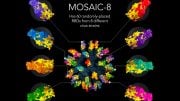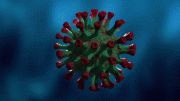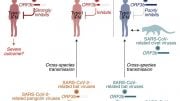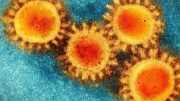
In a quest to demystify the origins and causes of “Long COVID” or PASC, recent research points to an unexpected connection: the common cold virus, OC43.
A study suggests that “Long COVID” may be linked to immune imprinting, where past virus exposures influence responses to new infections. Individuals with PASC showed weakened responses to SARS-CoV-2 but stronger reactions to another coronavirus, OC43. This insight may guide future treatment and risk assessment.
- Prior infection with a common cold coronavirus may predispose some people to develop Long COVID.
- The findings identify a potential marker that could help identify people at high risk of developing Long COVID.
Many infections with SARS-CoV-2, the virus that causes COVID-19, resolve within days or weeks. But a significant number of people have symptoms that linger for weeks, months, or even years. This is called post-acute sequelae of COVID-19 (PASC)—commonly known as “Long COVID.” While several risk factors for PASC have been proposed, we still don’t understand what causes it or why some people get it and others don’t. To further complicate matters, PASC may have different causes in different people.
Immune Responses and Long COVID
Some individuals with PASC have changes in certain immune responses, suggesting an immune mechanism for PASC. PASC is particularly common among people with systemic autoimmune rheumatic diseases. These are chronic diseases, such as lupus, where the immune system mistakenly targets the body’s own tissues to cause inflammation. Up to 45% of those with these rheumatic diseases who are infected with SARS-CoV-2 develop PASC.
Research Findings and Antibody Responses
An NIH-funded research team—led by Drs. Zachary Wallace at Massachusetts General Hospital (MGH), Jeffrey Sparks at Brigham and Women’s Hospital, and Galit Alter at MGH, MIT, and Harvard—examined antibody responses in people with rheumatic diseases who’d had COVID-19. The team measured antibody responses to SARS-CoV-2 and various other pathogens and vaccines. They compared the responses of those who developed PASC with those who didn’t. Results were published on September 6, 2023, in Science Translational Medicine.
The team found that participants with PASC had much weaker antibody responses to SARS-CoV-2 than those without PASC. However, those with PASC had enhanced responses to another coronavirus called OC43, an endemic virus that causes common cold-like symptoms. Moreover, the stronger the response to OC43 in people with PASC, the weaker their response to SARS-CoV-2. This suggests that antibodies against OC43 may also be reacting to SARS-CoV-2. The researchers observed these patterns in two independent groups of more than 40 patients with rheumatic diseases (about a third of whom had PASC).
Immune Imprinting and Its Implications
The findings indicate that PASC may arise from a phenomenon known as immune imprinting. This refers to how a person’s history of previous infections can affect their immune response to new infections. In this case, when a person who was previously exposed to OC43 is infected with SARS-CoV-2, their immune system responds partly by using antibodies developed during OC43 infection that also recognize SARS-CoV-2. This “recall” response to OC43 leads to an inefficient overall response to SARS-CoV-2. Further research will be needed to determine if and how this weak immune response may lead to PASC.
“When it comes to viruses, first exposure can shape lifelong immunity,” Alter explains. “We know that, in the setting of influenza, previous exposure to a viral strain can influence a person’s immune response to subsequent strains. This concept may be at play for coronaviruses, too, and may influence risk of Long COVID, especially among individuals with rheumatic disease.”
It remains to be seen whether these findings will also apply to people without rheumatic diseases. But the results may help explain why PASC develops, in at least some cases. They also provide clues to help guide the development of novel treatments. Finally, they suggest a marker that could help identify people at high risk of developing PASC for enrollment in more targeted clinical trials.
Reference: “Humoral immunity to an endemic coronavirus is associated with postacute sequelae of COVID-19 in individuals with rheumatic diseases” by Jonathan D. Herman, Caroline Atyeo, Yonatan Zur, Claire E. Cook, Naomi J. Patel, Kathleen M. Vanni, Emily N. Kowalski, Grace Qian, Shruthi Srivatsan, Nancy A. Shadick, Deepak A. Rao, Benjamin Kellman, Colin J. Mann, Douglas Lauffenburger, Zachary S. Wallace, Jeffrey A. Sparks and Galit Alter, 6 September 2023, Science Translational Medicine.
DOI: 10.1126/scitranslmed.adf6598
Funding: NIH’s National Institute of Allergy and Infectious Diseases (NIAID), National Cancer Institute (NCI), National Institute of Arthritis and Musculoskeletal and Skin Diseases (NIAMS), and National Center for Advancing Translational Sciences (NCATS); Nancy Zimmerman; Mark and Lisa Schwartz; Anonymous donor; Terry and Susan Ragon; Massachusetts General Hospital; Ragon Institute of MGH, MIT, and Harvard; Massachusetts Consortium on Pathogen Readiness; Bill and Melinda Gates Foundation; Global Health Vaccine Accelerator Platform; Musk Foundation; R. Bruce and Joan M. Mickey Research Scholar Fund; Rheumatoid Research Foundation; Doris Duke Charitable Foundation.









If PASC was due to weak immune response to SARS-CoV-2, as supposed by the researchers, mRNA vaccines would have been preventive against development of PASC.